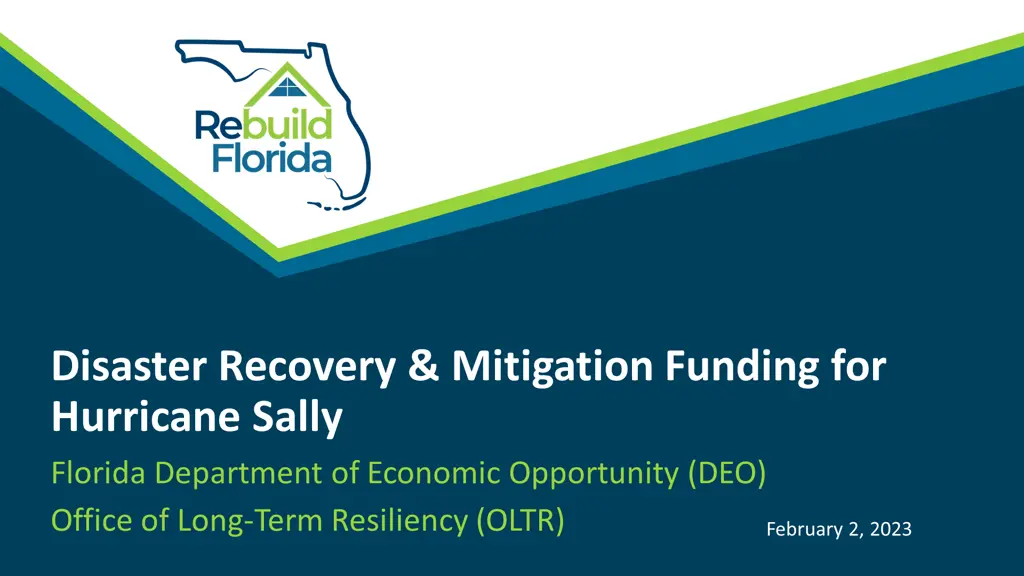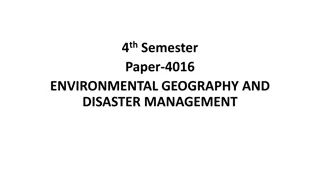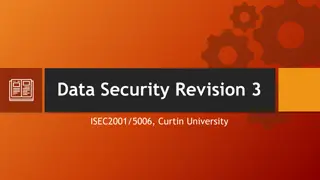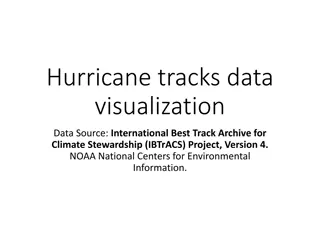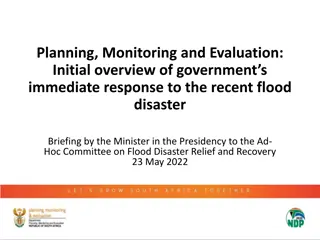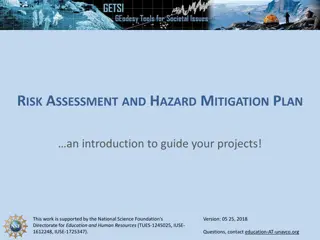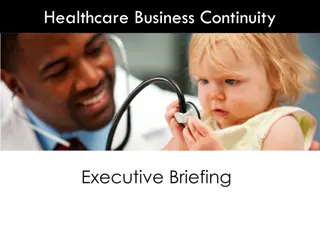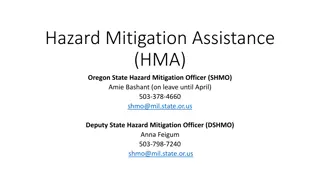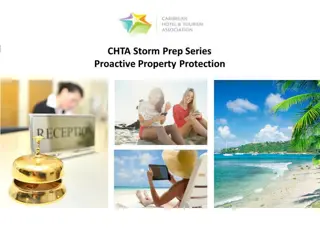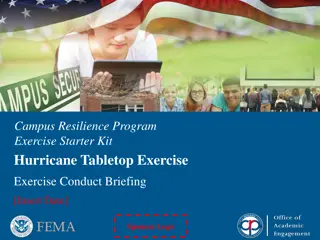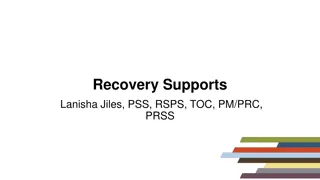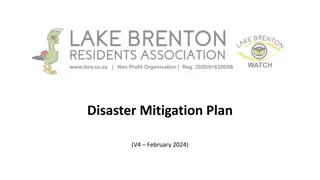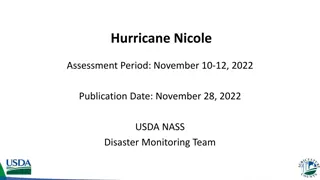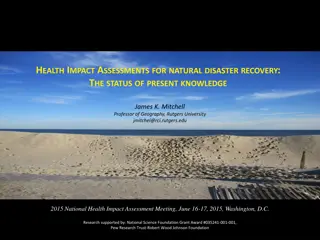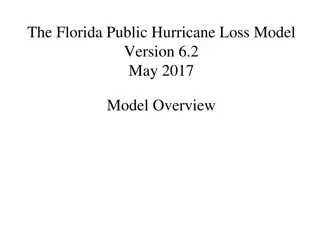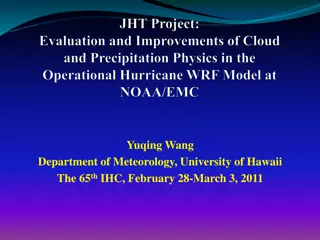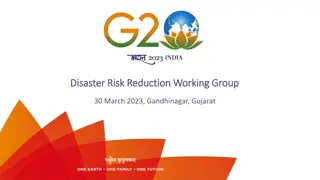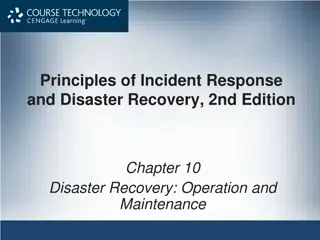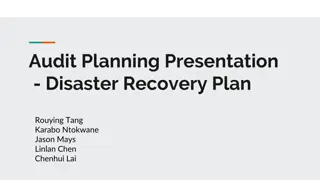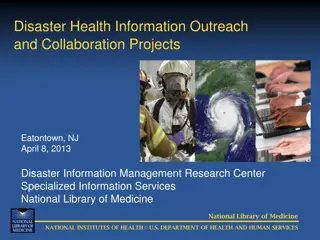Disaster Recovery & Mitigation Funding for Hurricane Sally
The funding opportunities available for disaster recovery and mitigation projects related to housing, infrastructure, and economic development in Florida communities impacted by Hurricane Sally. This session provides an overview of the programs, eligibility criteria, and application process.
Download Presentation

Please find below an Image/Link to download the presentation.
The content on the website is provided AS IS for your information and personal use only. It may not be sold, licensed, or shared on other websites without obtaining consent from the author.If you encounter any issues during the download, it is possible that the publisher has removed the file from their server.
You are allowed to download the files provided on this website for personal or commercial use, subject to the condition that they are used lawfully. All files are the property of their respective owners.
The content on the website is provided AS IS for your information and personal use only. It may not be sold, licensed, or shared on other websites without obtaining consent from the author.
E N D
Presentation Transcript
Disaster Recovery & Mitigation Funding for Hurricane Sally Florida Department of Economic Opportunity (DEO) Office of Long-Term Resiliency (OLTR) February 2, 2023
Agenda Introductions Overview of Hurricane Sally Community Development Block Grant Disaster Recovery & Mitigation (CDBG-DR & MIT) Timeline Most Impacted and Distressed (MID) Areas Subrecipient Overview Project Eligibility Overview Infrastructure Repair Program (IRP) Voluntary Home Buyout Program (VHB) Workforce Recovery Training Program (WRTP) Hometown Revitalization Program (HRP) Subrecipient Housing Repair and Replacement Program (HRRP) Workforce Affordable Housing Construction Program (WFAH) Federal Cross-Cutting Requirements Subrecipient Expectations Overview Environmental Review Process Application Process & Requirements Resources Questions
Disaster Recovery Team for Hurricane Sally Justin Domer Director, OLTR Lecia Behenna Bureau Chief, OLTR Garnet Nevels Deputy Bureau Chief, OLTR Amanda Iscrupe Infrastructure Program Manager, OLTR Taylor Doolin Disaster Recovery Program Manager, OLTR Anastasia Smith Subrecipient Housing Program Manager, OLTR Jody McCormick Grants Coordinator, OLTR
CDBG Disaster Recovery & Mitigation DEO, through OLTR, supports disaster recovery and mitigation projects related to housing, infrastructure, and economic development in Florida communities impacted by disasters. DEO is the governor-designated State authority responsible for administering all U.S. Department of Housing and Urban Development (HUD) Community Development Block Grant- Disaster Recovery (CDBG-DR) and Mitigation (CDBG-MIT) funds awarded to the State of Florida. DEO is currently administering long-term recovery and mitigation programs for Hurricanes Hermine, Matthew, Irma, and Michael. Sally programs have begun this year. "Rebuild Florida was created to brand the State s long-term disaster recovery and mitigation efforts.
Hurricane Sally CDBG Timeline September 2020:Hurricane Sally made landfall in the Florida Panhandle. October 29, 2021: $113,191,000 allocated from HUD. March 22, 2022:Additional $74,192,000 allocation from HUD. February 3, 2022:Federal Register published: FR Vol. 87 No. 23. Total FloridaAllocation: $187,383,000 August 5, 2022: HUD approved State of Florida sAction Plan for Hurricane Sally Disaster Recovery Programs. January 18, 2023: Launch of Infrastructure Repair Program (IRP) Application Cycle. January 24, 2023: Launch of Voluntary Home Buyout (VHB) Application Cycle. February 14, 2023: Launch of Workforce Recovery Training Program (WRTP) and Hometown Revitalization Program (HRP) Application Cycles. February 28, 2023: Launch of Subrecipient Housing Repair & Replacement Program (HRRP) Application Cycle.
Most Impacted and Distressed (MID) Areas HUD-Designated MID areas: Escambia County Santa Rosa County State-Designated MID areas: Bay County Okaloosa County Walton County
CDBG DR/CDBG MIT Subrecipients Subrecipients are non-federal entities that receive a subaward in order to carry out part of a federal program. Subrecipients have: Autonomy to make eligibility determinations. Responsibility to ensure performance outcomes and goals are met. Responsibility for making programmatic decisions. U.S. Department of Housing and Urban Development Florida Department of Economic Opportunity Community Development Block Grant - DR and/or MIT Program Subrecipient
Subrecipient Process Subrecipient Agreement Process Federal Regulations & Compliance Authority to Use Grant Funds Application Cycle Project Project and Grant Closeout Award Implementation Communication with DEO Ongoing Monitoring Reporting
Project Eligibility Overview Applicantsmust propose projects that meet the Hurricane Sally State Action Plan and Federal Register requirements, including, but not limited to: Projects located in HUD and State-identified MID areas. Projects that primarily serve Low to Moderate Income (LMI) populations. Projects that do not duplicate benefits. Municipalities, counties, and water management districts are eligible to apply. Activities funded by the CDBG-DR mitigation set-aside do not require a tie-back to the specific qualified disaster that has served as the basis for the grantee s allocation. Grantees must demonstrate that mitigation activities funded: Meet the HUD definition of mitigation activities; Address the current and future risks as identified in the grantee s mitigation needs; and Meet a National Objective.
Project Eligibility Overview, Continued Once fundamental requirements are met, eligible project activities include: Restoration Infrastructure damaged by Hurricane Sally. Creation Public facilities such as emergency community shelters. Demolition Rehabilitation of publicly or privately owned commercial or industrial buildings. Economic Revitalization Eligible activity that directly restores and improves an aspect of the local economy.
Rebuild Florida Infrastructure Repair Program (IRP) Total Allocation: $67,000,000 Designed to fund infrastructure restoration and improvement projects in communities impacted by Hurricane Sally. 15 percent of the allocation must be spent on projects that provide mitigation benefits. Minimum Award Amount: $750,000 Maximum Award Amount: $67,000,000 Application cycle is January 18 April 4, 2023
IRP Eligible Infrastructure Activities Restoration of infrastructure damaged by Hurricane Sally (such as water and sewer facilities, streets, removal of debris, drainage, bridges, etc.) Demolition and rehabilitation of publicly or privately-owned commercial or industrial buildings. Renourishment of protective coastal dunes systems and state beaches. Repairs to damaged buildings that are essential to the health, safety, and welfare of a community when repairs to these buildings constitutes an urgent need (this can include police stations, fire stations, parks and recreational centers, community and senior centers, hospitals, clinics, homeless shelters, schools and educational facilities, and other public properties, including properties serving as emergency shelters). Repairs to water lines and systems, sewer lines and systems, drainage, and flood mitigation systems.
IRP Eligible Mitigation Activities Development of mitigation standards, regulations, policies, and programs. Land use/zoning policies. Strong building code and floodplain management regulations. Dam safety programs, seawalls, and levee systems. Acquisition of flood prone and environmentally-sensitive lands. Retrofitting/hardening/elevating structures and critical facilities. Relocation of structures, infrastructure, and facilities out of vulnerable areas. Public awareness/education campaigns. Improvement of warning and evacuation systems.
Rebuild Florida Voluntary Home Buyout (VHB) Program Total Allocation: $22,000,000 Designed to encourage risk reduction by acquiring properties in high-risk flood areas. Properties acquired through buyouts will benefit areas in which at least 51 percent of the residents are LMI. Buyouts will only be available to qualifying LMI households. MinimumAward Amount: $750,000 Maximum Award Amount: $5,000,000 Application cycle is January 24 April 14, 2023
VHB Eligibility Requirements Applicants must meet eligibility requirements as outlined in section 105(a)(1) of theHousing and Community Development Act of 1974 (HCDA). Buyout projects, except those which qualify as meeting an urgent need, must benefit LMI persons through either LMA benefit or LMHI. To be considered eligible for the LMA or LMHI national objective criteria, applicants must meet the eligibility requirements outlined in Federal Register Vol. 87, No. 23 (p. 6373). The program is only for non-commercial properties, which may include owner-occupied structures, residential rental properties, or vacant lots. To be considered an eligible property for the buyout, the property must satisfy at least one of the following requirements: The property is located within a designated MID area; The property is located within a floodway; or The full fee title of properties must be from a willing, voluntary seller.
Rebuild Florida Subrecipient Housing Repair & Replacement Program (HRRP) Total Allocation: $45,000,000 Designed to repair, replace, and/or reconstruct homes damaged by Hurricane Sally with a focus on LMI communities. Fair housing requirements must be met. Minimum Award Amount: $750,000 Maximum Award Amount: $9,000,000 Application cycle is February 28 May 15, 2023
Subrecipient HRRP Eligible Activities Temporary Relocation Demolition/Clearance Single-Family Housing Rehabilitation/Repair Multi-Family Housing Rehabilitation/Repair Housing Construction Public Housing Emergency Community Shelters (public facilities) Homeless Shelter Repair and Replacement of Manufactured Housing Units Hazard Mitigation Elevation Planning Activities Related to Housing DEO will require construction methods and standards that emphasize quality, durability, energy efficiency, sustainability, and mold resistance.
Rebuild Florida Hometown Revitalization Program (HRP) Total Allocation: $13,513,850 Designed to support the recovery of economic activity in commercial areas of storm-impacted towns and cities to facilitate the recovery and return of businesses and jobs and the provision of goods and services to the community. Minimum Award Amount: $500,000 Maximum Award Amount: $5,000,000 Application cycle is February 14 to May 1, 2023.
HRP Eligible Activities Public facility improvements, including streetscapes, lighting, sidewalks, and other physical improvements to commercial areas. Acquisition, demolition, site preparation, or rehabilitation of commercial structures carried out by a unit of local government. Assistance to small businesses for rehabilitation and physical improvements to their places of business. Fa ade improvements to private or public structures in commercial areas.
Rebuild Florida Workforce Recovery Training Program (WRTP) Total Allocation: $5,000,000 Designed to provide funding opportunities for local workforce development boards, educational institutions and technical centers located in the communities most impacted by Hurricane Sally to train new workers in construction trades to help meet the increased demand for skilled workers. Minimum Award Amount: $1,000,000 Maximum Award Amount: $2,000,000 Application cycle is February 14 May 1, 2023
WRTP Eligible Activities Roofing Masonry Carpentry Concrete finishing Plumbing HVAC (heating, ventilation, and air conditioning) Electricity Heavy equipment operations Flooring installation / Carpet laying Glass / Window installation Plastering Welding Customized training tailored to the specific economic revitalization needs of the region
Federal Subrecipient Requirements Overview Subrecipients carrying out federally-funded activities under the Sally CDBG programs are expected to understand and comply with federal regulations outlined in the subrecipient agreements, including those related to: Procurements Environmental Reviews Labor Standards Relocations Fair Housing Audits Monitoring subcontractors for compliance Maintaining comprehensive program records Monitoring and reporting on activity progress Meeting performance goals
Federal Subrecipient Procurements & URA Requirements Procurements Subrecipients are required to carry out all procurements in compliance with the federal requirements under 2 CFR 200.318-326 and 200.330. Fair and open competition for all federally-funded procurements is essential. Uniform Relocation Assistance and Real Property Acquisition Policies Act (URA) Any property acquisition, rehabilitation, or demolition to be reimbursed with HUD funds are subject to URA rules. Subrecipients must submit all documentation required including a notice to property owners of their URA rights, an invitation to accompany the appraiser, all appraisals, offer to the owner, acceptance, contract for sale, statement of settlement costs, copy of deed, and waiver of rights (for donations), as applicable. No acquisition of a property should be done prior to the completion of an Environmental Review on the property.
Federal Cross-Cutting Requirements Section 3 Subrecipients will encourage their contractors to hire qualified low and very low-income persons for any job openings that exist on CDBG-DR-funded projects and to maintain records to document the number of hours these LMI persons worked on CDBG-DR-funded projects. A Section 3 Contract Clause must be included in all CDBG-DR funded contracts. Labor Standards Davis Bacon all laborers and mechanics employed by contractors or subcontractors for performing construction work financed in whole or in part with CDBG-DR funds must be paid wages at rates not less than those prevailing on similar construction in the locality. Copeland Anti-Kickback Act Subrecipient will maintain documentation that demonstrates compliance with applicable hour and wage requirements. The documentation must be made available to DEO for review upon request. We recommend using Form WH-347 for certified weekly payroll & interviews.
Federal Civil Rights Compliance Fair Housing Subrecipients must certify that they will "affirmatively further fair housing" in its community and undertake an activity each quarter to affirmatively further fair housing. Equal Employment Opportunity (EEO) A family of laws that prohibit discrimination of various kinds against protected classes of people. Section 504 of the Rehabilitation Act of 1973 Protects persons with disabilities from discrimination and the Americans with Disabilities Act. Americans with Disabilities Act (ADA) Protects persons with disabilities in many areas of public life including parking and access to commercial and public state and local facilities.
Environmental Review Requirements All CDBG-DR projects require some level of environmental review Many projects require a two-step review process: Exempt Activities Certification: Planning, administrative and operating costs Full environmental review: Remaining project activities IMPORTANT: Once an application is submitted, the appropriate level of environmental review must be completed before entering into new contracts or conducting project- related activities. Project funds ARE NOT reimbursable until a Subrecipient Agreement is executed, and an Exempt Activities Certification is approved.
Hurricane Sally CDBG-DR/CDBG-MIT Application Process
How to Submit an Application Applicants must submit an online Application Request Form to begin the application process. The links to the forms are available on each Rebuild Florida Hurricane Sally Program Page (i.e., the unique pages for IRP, VHB, WRTP, HRP, HRRP, and WFAH). After DEO receives a Request Form, we will provide a link to the application portal. A separate Request Form and link is needed for every proposed project application. Applications must be submitted through the online application portal. However, DEO recommends that applicants draft a Word or PDF version, both for ease of editing during application preparation, and so as to have a backup version of the application for your files.
Application Submission Tips Tips: Make sure your Wi-Fi connection is strong and reliable. Don t delete cookies. To navigate through the application, click the green arrow buttons on the bottom pane of the application. Do not click the back button in the top left-hand corner of your browser. The application system saves as you work. There is no save button. Do click past the signature page until you are finished, or your application will automatically submit.
Required Information & Documentation Basic Applicant Information FEIN and UEI Numbers Flood Insurance Status Qualifying MID Location Contact & Co-Applicant Information Citizen Participation Public Notice Public Hearing Agenda & Minutes Public Comments Maps Project Service Area Most Recent Floodplain LMI Service Area Photographs Organizational Chart Template Work Plan Template National Objective LMI Census Data or Survey Data
Required Information & Documentation, Continued Narratives Project Description Damage Summary & Tieback to Hurricane Sally Unmet Needs Management Capacity Procurement Process Readiness to Proceed Budget including any quotes and leveraged funds
Helpful Links & Questions Tolearn more about the DEO Long-Term Resiliency and programs available to disaster-impactedcommunities, visit our Hurricane Sally webpage. Program-specific emails are: HRP/WRTP: OLTR-ER@DEO.MyFlorida.com IRP: CDBG-DRInfrastructureApp@DEO.MyFlorida.com VHB/HRRP: HousingSubrecipient@DEO.MyFlorida.com
